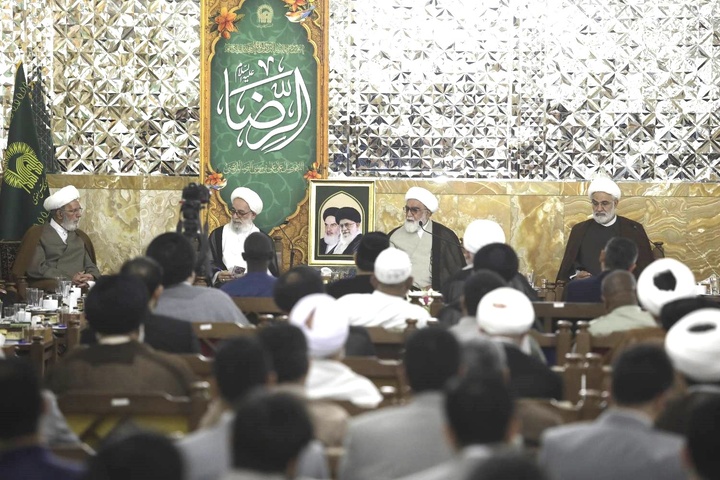During an international gathering at Imam Reza shrine, northeast Iran, Ayat. Marvi highlighted the significance of the message by Ayat. Khamenei, the Leader of the Islamic Revolution, describing it as a comprehensive directive derived from decades of experience in religious affairs.
He commended the efforts of Ayat. A’rafi, the Director of Seminaries, and other organizers, stressing, “The anniversary event was merely the first step. It is incumbent upon scholars and clerics to study the message carefully and ensure its proper implementation within religious institutions”.
AQR’s Custodian noted: “Islamic teachings must be fully integrated into society, and seminaries should not function as isolated academic centers but as institutions that actively shape religious understanding and guide people’s lives”.
He warned of external efforts to dilute religious observances, turning them into mere formalities devoid of their deeper significance. “Preserving the true essence of Ahl al-Bayt’s teachings is crucial in safeguarding Islamic identity”.
The top official referenced historical attempts to suppress Islamic traditions, particularly during Reza Shah’s rule, when mourning ceremonies were banned, forcing believers to conduct them secretly within their homes.
He explained: “While efforts to physically ban religious ceremonies failed, adversaries today employ different strategies, seeking to strip religious practices of their deeper meaning”.
According to Ayat. Marvi, scholars and religious leaders must remain vigilant and actively work to ensure that Islamic traditions retain their spiritual and intellectual strength.
“The revolutionary role of the Imams are highly important, and their mission was not only to guide believers spiritually but also to establish Islamic governance”, he underscored.
Ayat. Marvi questioned whether Islamic rulings could be upheld without a structured governing system, emphasizing that all Imams sought the formation of an Islamic government as a means to safeguard religious laws.
Further in his remarks, the Custodian of Astan Quds Razavi highlighted Imam Sajjad’s perseverance in preserving Ahl al-Bayt’s legacy despite widespread abandonment after Karbala.
“Through sustained effort, Imam Sajjad transformed the intellectual landscape, paving the way for Imam Baqir and Imam Sadiq’s scholarly contributions, which strengthened Islamic teachings”, he stressed.
Reflecting on Qom Seminary’s history, Ayat. Marvi praised Sheikh Abdulkarim Haeri’s role in reviving religious education during a period when restrictions on clergy were severe.
He recalled how Reza Shah banned religious attire and attempted to dismantle seminaries in Iran, seeing them as obstacles to his ideological agenda.
“Despite these challenges, Qom Seminary re-emerged with strength, playing a pivotal role in the eventual downfall of oppressive rule in Iran”, Ayat. Marvi explained.
Turning to Lebanon, the top official stated that Hezbollah’s endurance against prolonged Israeli military operations proves the effectiveness of steadfast resistance.
“Israel waged an intense military campaign against Hezbollah for 60 days, deploying advanced weaponry and intelligence tactics; however, Hezbollah remained firm, demonstrating that persistence can overcome military aggression”, he said.
Ayat. Marvi pointed out that Israel’s request for a ceasefire was a clear indication of its failure to achieve its objectives, proving that “unwavering commitment leads to victory”.
He also highlighted growing anti-Israel sentiments in American universities, describing them as a sign of divine assistance and an emerging shift in global awareness. “These protests, taking place in elite institutions responsible for shaping future U.S. leaders, reflect a broader transformation in political perspectives”.
He stressed that justice would ultimately triumph over oppression, and committed resistance would inevitably lead to victory.
Ayat. Marvi urged religious scholars to heed the Leader’s message, treating it as a roadmap for future action.
He concluded his remarks by emphasizing the vital role of Islamic seminaries in shaping the ideological and spiritual foundations of the Muslim world.

Ayat. Ahmad Marvi, the Custodian of Astan Quds Razavi (AQR), emphasized that the Leader’s message to the centennial anniversary of Qom Seminary serves as a foundational charter for shaping the future of Islamic seminaries and religious leadership.
News Code 6417

Your Comment